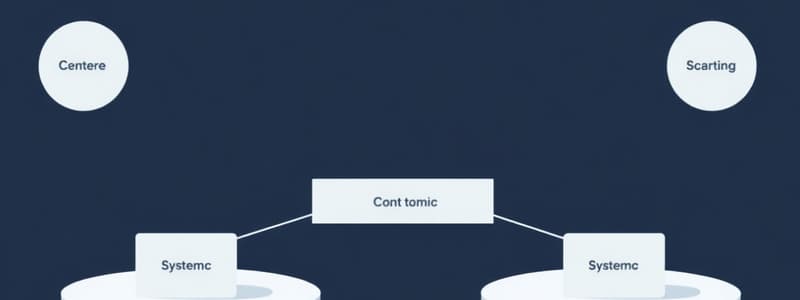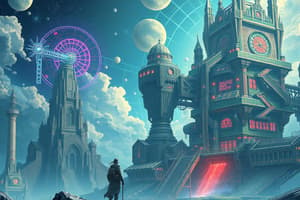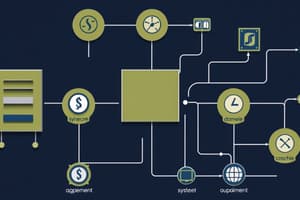Podcast
Questions and Answers
Why is it important to view a system as a whole instead of considering each component separately?
Why is it important to view a system as a whole instead of considering each component separately?
- Each component has a fixed purpose regardless of others.
- Interactions among components significantly affect overall system performance. (correct)
- A system can be designed without considering external factors.
- Components can function independently without interaction.
Which of the following describes a natural system?
Which of the following describes a natural system?
- It is characterized by strict control mechanisms.
- It relies on abstract ideas and specifications.
- It includes systems that develop through natural processes. (correct)
- It consists of components designed by engineers.
What type of system is defined as one where the output depends on past or future inputs in addition to the present input?
What type of system is defined as one where the output depends on past or future inputs in addition to the present input?
- Dynamic system (correct)
- Memoryless system
- Information system
- Static system
What is a key characteristic of a closed-loop system?
What is a key characteristic of a closed-loop system?
Which system classification is defined by the presence of activity combined with structural components?
Which system classification is defined by the presence of activity combined with structural components?
Which of the following describes the primary function of processing in an information system?
Which of the following describes the primary function of processing in an information system?
What role do environmental factors like customers and suppliers play in an information system?
What role do environmental factors like customers and suppliers play in an information system?
In terms of system functionality, what must a system be capable of achieving?
In terms of system functionality, what must a system be capable of achieving?
Which of the following best describes a conceptual system?
Which of the following best describes a conceptual system?
In which type of system does output not depend on previous or future inputs?
In which type of system does output not depend on previous or future inputs?
What distinguishes human-made systems from natural systems?
What distinguishes human-made systems from natural systems?
Which statement correctly describes the relationship between Information Systems and Information Technology?
Which statement correctly describes the relationship between Information Systems and Information Technology?
What is the primary purpose of feedback within an information system?
What is the primary purpose of feedback within an information system?
What is a defining feature of an open-loop control system?
What is a defining feature of an open-loop control system?
What is an essential output of an information system?
What is an essential output of an information system?
Which component of an information system captures or collects raw data?
Which component of an information system captures or collects raw data?
What is a defining characteristic of a system?
What is a defining characteristic of a system?
Which of the following best describes systems theory?
Which of the following best describes systems theory?
In system analysis, what is the significance of subsystems?
In system analysis, what is the significance of subsystems?
What role do resources play within a system?
What role do resources play within a system?
How can a system be described in terms of hierarchy?
How can a system be described in terms of hierarchy?
What does fulfilling a specified operational requirement imply for a system?
What does fulfilling a specified operational requirement imply for a system?
What is the importance of understanding interactions between components in a system?
What is the importance of understanding interactions between components in a system?
Why is it risky to leave the combination of resources to chance in a system?
Why is it risky to leave the combination of resources to chance in a system?
Flashcards
System
System
A complex combination of resources (people, materials, equipment, etc.) working together to achieve a specific goal.
System Theory
System Theory
A way of understanding a phenomenon as a whole, not just its parts, focusing on how parts interact.
System Components
System Components
The individual elements that make up a system (e.g., people, equipment, data, software).
System Interactions
System Interactions
Signup and view all the flashcards
System Characteristics
System Characteristics
Signup and view all the flashcards
Subsystem
Subsystem
Signup and view all the flashcards
Operational Requirement
Operational Requirement
Signup and view all the flashcards
System Hierarchy
System Hierarchy
Signup and view all the flashcards
What is a system?
What is a system?
Signup and view all the flashcards
Why is system thinking important?
Why is system thinking important?
Signup and view all the flashcards
System purpose
System purpose
Signup and view all the flashcards
Physical system
Physical system
Signup and view all the flashcards
Conceptual system
Conceptual system
Signup and view all the flashcards
Closed-loop system
Closed-loop system
Signup and view all the flashcards
Open-loop system
Open-loop system
Signup and view all the flashcards
Static vs. Dynamic systems
Static vs. Dynamic systems
Signup and view all the flashcards
Static System
Static System
Signup and view all the flashcards
Dynamic System
Dynamic System
Signup and view all the flashcards
Memoryless System
Memoryless System
Signup and view all the flashcards
Information Technology (IT)
Information Technology (IT)
Signup and view all the flashcards
Information System
Information System
Signup and view all the flashcards
Input
Input
Signup and view all the flashcards
Processing
Processing
Signup and view all the flashcards
Output
Output
Signup and view all the flashcards
Study Notes
Introduction to System Theory
- System theory analyzes phenomena as a whole, not just the sum of parts.
- Focus is on interactions and relationships between parts.
- Used to understand organization, functioning, and outcomes of an entity.
Definition of System
- A system is a complex combination of resources (people, materials, equipment, hardware, software, facilities, data, information, services).
- These resources work together to fulfill a specific operational requirement.
- Each element directly supports the accomplishment of a given mission scenario.
Definition of System Theory
- A theoretical perspective analyzing a phenomenon as a whole, not just individual elements.
- Emphasis is on the interactions and relationships between parts.
- Aims to understand an entity's organization, functioning, and outcomes.
System Characteristics
- Systems are composed of interconnected components working towards a shared goal.
- Resources include humans, materials, equipment, hardware, software, facilities, and data.
- Many functions often require considerable personnel, equipment, and data resources.
- Effective implementation requires carefully integrating resources.
- Systems exist within a hierarchy; performance is influenced by higher-level systems.
System Characteristics (cont.)
- A system can be broken down into subsystems and related components.
- Interactions among components are crucial for effective design.
- Analyzing components separately is insufficient for effective design; system should be viewed as a whole.
- Interrelationships between components must be understood.
- Systems have a purpose to serve identified needs or objectives.
- Overall objective needs to be achieved in a cost-effective manner.
System Classification
- Systems can be classified as physical, conceptual, natural, human-made, closed-loop, open-loop, static, and dynamic systems.
- Physical systems consist of real components occupying space.
- Conceptual systems are ideas, specifications, and plans for organization.
- Natural systems arise from natural processes.
- Human-made systems are developed by humans.
System Classifications (cont.)
- Closed-loop systems are relatively self-contained, not interacting significantly with the environment.
- Open-loop systems interact with their environments.
- Static systems have unchanging structure and responses depend solely on current input.
- Dynamic systems have varying structure involving components and outputs influenced by past/future inputs.
Understanding Information Systems
- Information Technology (IT) encompasses hardware and software used by firms.
- An information system is a collection of interdependent components for collecting, processing, storing, and distributing information.
- Supports decision making and control in organizations.
Information System (cont.)
- Activities include input, processing, and output.
- Input involves collecting raw data.
- Processing transforms raw data.
- Output is the result of processing, providing useful information for decision making.
Functions of Information Systems
- Systems contain organization and environmental information (e.g., competitors, customers, suppliers).
- Input: Raw data from internal and external environments.
- Processing: Transforming data into useful information.
- Output: Distributing processed information for decision-making and control.
- Feedback: Information returned for subsequent action.
Studying That Suits You
Use AI to generate personalized quizzes and flashcards to suit your learning preferences.




